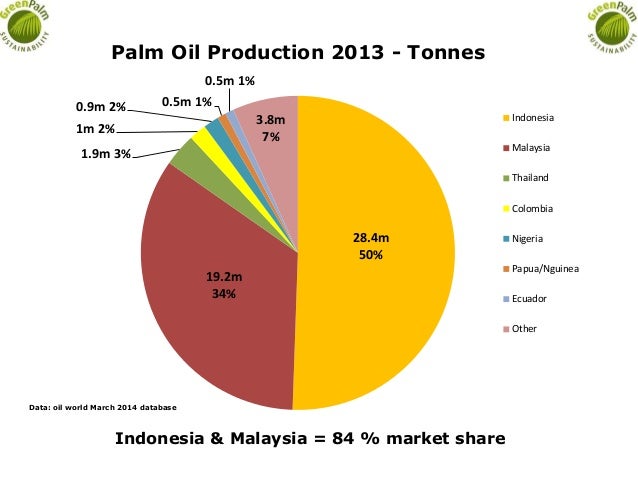 |
| Palm oil production by country, from GreenPalm |
Crude palm oil comes from the oil palm, Elaeis guineensis, which is grown primarily in Indonesia and Malaysia but also in the countries shown to the right. Many of those countries are covered in tropical forests, so planting oil palms requires burning and clearing the trees and peatland. Most of us know the US and China are the two countries that emit the most greenhouse gases, but surprisingly Indonesia is also at the top, mainly because of the thriving palm oil industry. The large-scale burning leads not only to carbon emissions but also to environmental damages that come with deforestation. Soils that are no longer anchored by roots wash away with seasonal rains, causing landslides while habitat loss threatens endangered species.
 |
| A baby Bornean orangutan photographed by Suzi Eszterhas. |
Indonesia's case is especially dire. The country accounts for 50% of total palm oil exports, and is expected to produce 40 million tons by the end of the decade. But as a result, nearly 80% of Indonesia's GHG emissions come from forest and peatland clearing. If Indonesia is projected to produce even more palm oil, these emissions will likely only increase unless an alternative method is adopted. This is especially disheartening since Indonesia is home to the world's 3rd largest tropical forest and to 15% of the world's known species. Already the population of orangutans in Indonesia decreased to 50,000 from 150,000, and there are only about 400 Sumatran white tigers left in the wild. Deforestation also harms locals who depend on forests to survive, get caught up in land disputes, or become displaced.
Although Indonesia is thousands of miles away from those of us in America, palm oil certainly is not. In fact, it seems to be in everything, from Oreo's to soap, because of its versatility. Palm oil has dozens of aliases, blending into ingredient lists pretty well, so even those who are watching out for it still miss it. So basically, it seems like we can't avoid palm oil no matter how much we hate its effects on the planet, like there is nothing to be done.Thankfully, that's not entirely true. Some manufacturers that comply to strict standards outlined by the Roundtable on Sustainable Palm Oil (RSPO) are able to grow certified sustainable palm oil (CSPO). The RSPO is called a sustainability standard, and is based on principles and methods (in the image below) that ensure an industry is operated as ethically as possible. Palm oil grown in this way can be identified thanks to GreenPalm's label, proving its certification. Companies that buy palm oil (and eventually, consumers as well) can then source palm oil grown in much healthier ways.
 |
| The principles upon which the RSPO is based. |
If all of these improvements will stick, then the outstanding economic benefits of producing palm oil do not have to come at a detriment to the environment, the community, and to endangered species. Sometimes, I'm pessimistic about the difference an individual can make, so I'm glad that the companies and manufacturers have taken responsibility for their actions.
Ruxi, I never even knew that palm oil had such a big role in replacing trans fats, and I consider myself fairly well read, and read the New York Times and Washington Post regularly. Very informative article, and important information to know when trying to buy products responsibly. Very well done!
ReplyDeleteThank you! I wasn't very aware of it either; I thought it was just another commonplace oil. But it's so ubiquitous nowadays that pretty much everyone comes into contact with it at some point in their day.
ReplyDeleteThe report is seen as state of the art on medical CBD capsules as well as recreational use. This article draws heavily on this resource.
ReplyDelete